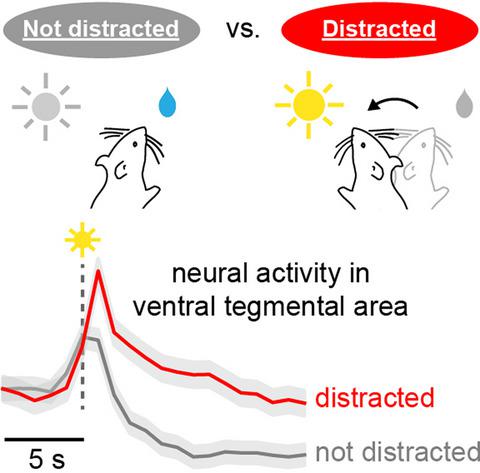当前位置:
X-MOL 学术
›
Eur. J. Neurosci.
›
论文详情
Our official English website, www.x-mol.net, welcomes your
feedback! (Note: you will need to create a separate account there.)
Distracting stimuli evoke ventral tegmental area responses in rats during ongoing saccharin consumption
European Journal of Neuroscience ( IF 2.7 ) Pub Date : 2021-01-11 , DOI: 10.1111/ejn.15108 Kate Z Peters 1, 2 , Andrew M J Young 1 , James E McCutcheon 1, 3
European Journal of Neuroscience ( IF 2.7 ) Pub Date : 2021-01-11 , DOI: 10.1111/ejn.15108 Kate Z Peters 1, 2 , Andrew M J Young 1 , James E McCutcheon 1, 3
Affiliation

|
Disruptions in attention, salience and increased distractibility are implicated in multiple psychiatric conditions. The ventral tegmental area (VTA) is a potential site for converging information about external stimuli and internal states to be integrated and guide adaptive behaviours. Given the dual role of dopamine signals in both driving ongoing behaviours (e.g., feeding) and monitoring salient environmental stimuli, understanding the interaction between these functions is crucial. Here, we investigate VTA neuronal activity during distraction from ongoing feeding. We developed a task to assess distraction exploiting self‐paced licking in rats. Rats trained to lick for saccharin were given a distraction test, in which three consecutive licks within 1 s triggered a random distractor (e.g. light and tone stimulus). On each trial they were quantified as distracted or not based on the length of their pauses in licking behaviour. We expressed GCaMP6s in VTA neurons and used fibre photometry to record calcium fluctuations during this task as a proxy for neuronal activity. Distractor stimuli caused rats to interrupt their consumption of saccharin, a behavioural effect which quickly habituated with repeat testing. VTA neural activity showed consistent increases to distractor presentations and, furthermore, these responses were greater on distracted trials compared to non‐distracted trials. Interestingly, neural responses show a slower habituation than behaviour with consistent VTA responses seen to distractors even after they are no longer distracting. These data highlight the complex role of the VTA in maintaining ongoing appetitive and consummatory behaviours while also monitoring the environment for salient stimuli.
中文翻译:

正在进行的糖精消耗过程中,分散注意力的刺激会引起大鼠腹侧被盖区的反应
注意力分散,显着性和分心性增加与多种精神疾病有关。腹侧被盖区(VTA)是一个可能的位置,用于整合有关外部刺激和内部状态的信息以进行整合并指导适应性行为。鉴于多巴胺信号在驱动正在进行的行为(例如进食)和监测重要的环境刺激中均具有双重作用,因此了解这些功能之间的相互作用至关重要。在这里,我们调查了持续进食引起的注意力分散期间的VTA神经元活动。我们开发了一项任务,以利用大鼠自律性舔assess来评估注意力分散。对训练舔糖精的大鼠进行干扰试验,其中在1 s内连续三次舔triggered会触发随机干扰物(例如光和音调刺激)。在每项试验中,根据他们舔舔行为的停顿时间,将他们量化为分散注意力或不分散注意力。我们在VTA神经元中表达了GCaMP6s,并使用纤维光度法记录了此任务期间钙的波动,以作为神经元活动的代理。干扰性刺激导致大鼠中断糖精的消耗,这种行为效应很快因重复测试而变得习惯。VTA神经活动显示干扰物呈持续增加趋势,此外,与非干扰性试验相比,干扰性试验的反应更大。有趣的是,即使在不再分心的情况下,神经反应的习惯化行为也要比对分心者具有一致的VTA反应的行为慢。
更新日期:2021-01-11
中文翻译:

正在进行的糖精消耗过程中,分散注意力的刺激会引起大鼠腹侧被盖区的反应
注意力分散,显着性和分心性增加与多种精神疾病有关。腹侧被盖区(VTA)是一个可能的位置,用于整合有关外部刺激和内部状态的信息以进行整合并指导适应性行为。鉴于多巴胺信号在驱动正在进行的行为(例如进食)和监测重要的环境刺激中均具有双重作用,因此了解这些功能之间的相互作用至关重要。在这里,我们调查了持续进食引起的注意力分散期间的VTA神经元活动。我们开发了一项任务,以利用大鼠自律性舔assess来评估注意力分散。对训练舔糖精的大鼠进行干扰试验,其中在1 s内连续三次舔triggered会触发随机干扰物(例如光和音调刺激)。在每项试验中,根据他们舔舔行为的停顿时间,将他们量化为分散注意力或不分散注意力。我们在VTA神经元中表达了GCaMP6s,并使用纤维光度法记录了此任务期间钙的波动,以作为神经元活动的代理。干扰性刺激导致大鼠中断糖精的消耗,这种行为效应很快因重复测试而变得习惯。VTA神经活动显示干扰物呈持续增加趋势,此外,与非干扰性试验相比,干扰性试验的反应更大。有趣的是,即使在不再分心的情况下,神经反应的习惯化行为也要比对分心者具有一致的VTA反应的行为慢。











































 京公网安备 11010802027423号
京公网安备 11010802027423号